Abstract
Food security is reliable provision of citizens with food, domestic high-quality agricultural products. This is a guarantee of the stability of the domestic market, independent of external circumstances, the availability of the necessary strategic stock and reserves in case of emergency. This is the availability of the acquisition of goods necessary for complete sustenance. Sustainable development of agro-industrial enterprises, which allows talking about the country's complete self-production, is directly related to the food independence of the state. Ensuring food security is not aimed at the productive activities of organizations and agro-industrial complexes, but primarily at increasing the level of vital life sustenance of the population and raising the level of the general welfare of the Russian economy. Thus, food security is considered the most important link in the national security system of Russia. The concept given by the author in the Food Security Doctrine quite fully indicates every aspect of this concept. The article discusses the main risks and threats, as well as internal factors affecting the national food security, the main aspects of state support of agriculture, ensuring the food independence of the Russian Federation are shown.
Keywords: Food securitythreatsrisksstate support
Introduction
Nowadays, economic science is based on the idea that economic interests are directly dependent on economic needs, the materialization of which accompanies the emergence of the property subjects’ relations with economic agents. In this regard, the economic interests are often understood as meaningful needs, manifested in the form of consumption of socio-economic benefits. The economic benefits are those created by human labour in order to meet the specific needs of an individual. The target setting of the agro-industrial complex is the utmost satisfaction of the population needs for food.
In the economy of any state, the food self-sufficiency is of particular importance, the country must have own food production. Given the geographic location and differences in the provision of natural resources, the countries find themselves in unequal conditions in the production of certain food products. These circumstances force countries to resort to the import of raw materials, materials, as well as finished agricultural products.
However, many scientists considered the import of goods as a potential threat to the food security of the country. So, according to Ricardo (1955), the country’s dependence on foreign goods poses an immediate threat to the sovereignty of the country (1955). Bychkova (2016) believed that food security can only exist in conditions of partial or complete termination of import of foreign goods into the territory of the country.
According to Kleiner (2010), the economy has to increase the intensity of use of various types of resources, including space (territory). The existence of weak ties between the economies of individual regions slows down the spread of innovations, hinders the optimization of resource allocation, exacerbates the socio-economic differences of regions, lowers the potential of the economy as a whole, and also threatens the loss of economic independence of the country.
An exceptional role in the state economy is played by the sectors aimed at satisfying the priority needs of citizens. These include agriculture, industries that manufacture agricultural means of production, industries that process agricultural products, which together form an agro-industrial complex. The agro-industrial complex is a sector of the economy that forms the food market of the country, ensuring the food security of the population.
Dependence on food import serves as a significant threat to the country's food security. Along with this, the import reduces the economic potential of the country, thus the country's national strength.
However, the introduction of bans on the supply of imported products should be accompanied by an increase in domestic production, including an increase in financing domestic agriculture. An important step for creating a favourable environment for an effective import substitution policy should be not only the production of a certain level of agricultural products to cover domestic demand but also the increase in export to other countries and the entry of Russian producers into the world markets.
Problem Statement
The most urgent problem of all humankind is the problem of ensuring the food security of all countries of the world. The creation of the United Nations (the UN) has encouraged the world population to pay particular attention to overcoming the risks and threats of food security. In addition, issues of customs and tariff regulation, phytosanitary and veterinary medicine, administrative barriers are the priority tasks of a systemic solution, the implementation of which will accelerate a breakthrough in the agricultural industry. Ensuring food security of the population is considered the most complex and multifaceted task of the countries of the world.
Research Questions
Main risks and threats, as well as internal factors affecting the national food security, the main aspects of state support of agriculture, ensuring the food independence of the Russian Federation are shown.
Purpose of the Study
The purpose of the study is to disclose the main risks and threats affecting the food security in the Russian Federation.
Research Methods
In the process of considering the research topic, a number of scientific research methods was used, such as general logical and theoretical methods. At the same time, the study is associated with the perception of the problem under consideration.
The graphic, logical, and information analysis served as the methodological basis of the study. The theoretical and empirical approaches to the study of the research problem were used.
Ensuring the food security of the country is the most difficult and multifaceted task.
The authors Altukhov et al. (2019) considered in their works the aspects of the agri-food sector, its problems, risks and new opportunities in Russia, the mechanism for ensuring the food security is shown in the works of Fyodorov and Kurdyumov (2012). A deep analysis of the agricultural sector of the Russian Federation was investigated in the works of Miloserdov and Miloserdov (2002), as well as by a number of Russian scientists (Ushacheva et al., 2007).
Research Results
The implementation of the state economic policy in the field of ensuring the food security of the Russian Federation is enshrined in the norms of the national legislation, where the Food Security Doctrine of the Russian Federation is a key source of norms and legal support.
The previous doctrine of the early edition defined the threshold values for eight groups of food types; the present includes three more - these are vegetables, fruits, and seeds of the main agricultural crops.
The Doctrine defines the food independence as the percentage of self-production, calculated as the ratio of the domestic production volume of agricultural products, raw materials and food to the volume of their domestic consumption and having threshold values (Figure
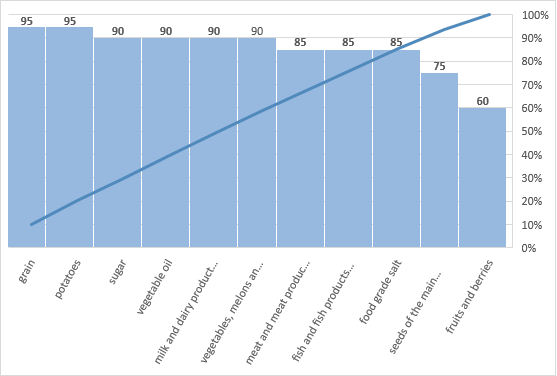
At the Government Session (March 2020), the Minister of Agriculture of the Russian Federation Dmitry Patrushev noted in his report “On the Development Strategy of the Agro-Industry and the Fisheries Industry until 2030” that “In recent years, the agro-industrial complex, due to the state support, among other things, has been demonstrating steady growth, acts as one of the drivers of the domestic economy and has a direct impact on ensuring sustainable socio-economic development”.
The measures provided for in the state program for the agro-industrial complex of the Russian Federation directly affect the achievement of the goal - ensuring the food security and independence of the country's population. Prospects in this direction are associated with technical and technological modernization, the development of land reclamation and increasing the efficiency of agricultural production as a whole.
In addition, Patrushev (2020) explained that
...
Food security is a guarantee of sustainable development of the world, for this, it is necessary to strive to achieve a balance in the volumes of consumption and production, which depends on many different factors (Figure
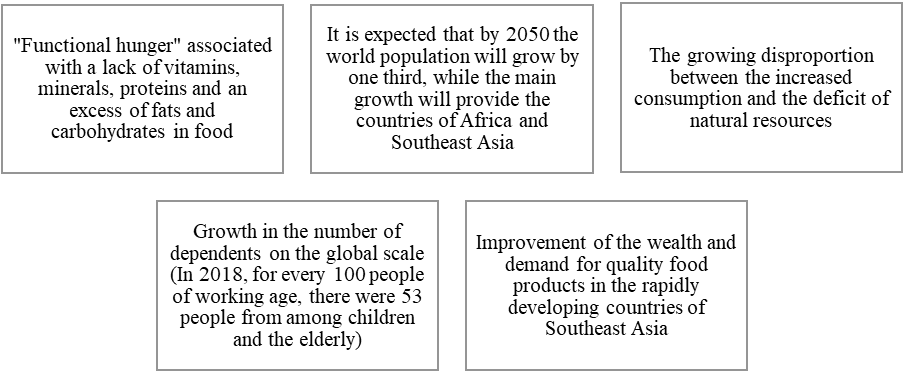
The main factors that have a significant impact on the global food security market are the “Functional Hunger”, population growth, and demand for quality products. And according to forecast calculations, by 2050 new technologies and climate change will be added to them.
Thus, according to experts, with the continuation of this trend, the world population in 2050 will amount to 9.7 billion people, while more than half of the expected growth will occur in Africa, where the population will increase from 1.2 to 2.6 billion people, which will complicate the solution of poverty and hunger problem. During this period, in Asia, population growth is expected to be at the level of 20%, in South America up to 30%, in Europe a decline of 3% is projected. However, according to experts, with increased migration to European countries, the population by 2050 may remain at the 2010 level (Figure
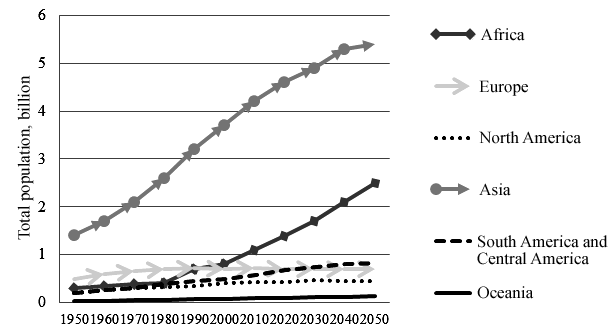
Data from the Federal customs service of the Russian Federation indicate that imports of food and agricultural raw materials in the Russian Federation currently exceed exports. Therefore, the main objective of the approved Doctrine is to increase export supplies of agricultural products over imports.
Altukhov (2019) identified the main internal and external factors that influence and ensure national food security (Figure
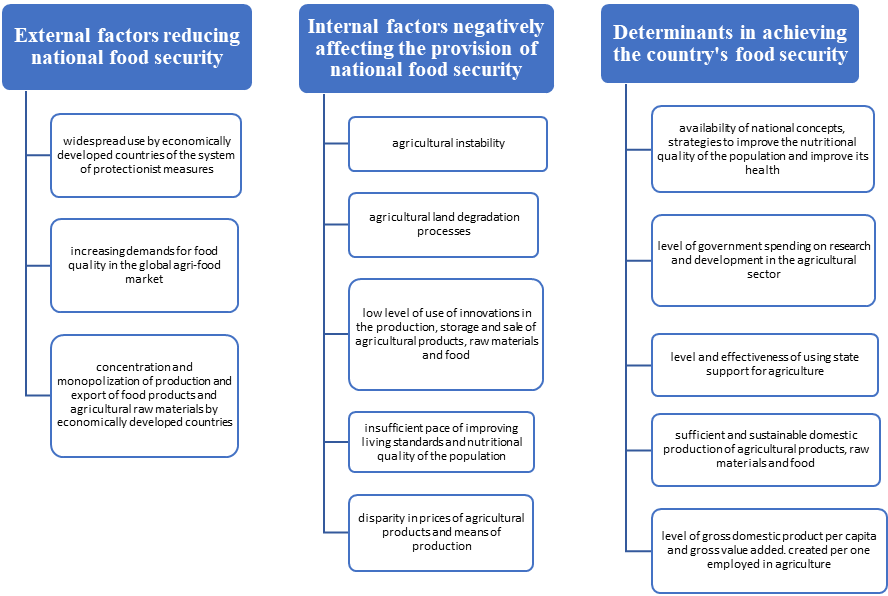
Having analyzed the factors affecting food security in the world, it can be stated that the problems of food insecurity of the world population are the most relevant today, and accordingly, the food products can be attributed to the most important strategic global resource, with the allocation of the necessary state support.
The deteriorating environmental situation around the world is causing enormous damage to almost all areas of the economy, which ultimately affects food production.
The factors that disrupt natural processes for a long time serve as irreplaceable damage to food production, with serious consequences for the future generation.
These are just some of the factors that affect green food production and negatively affect food security in the world.
The real threat today is the loss of significant areas of cropland due to their salinization and waterlogging. The destruction of the ozone layer of the planet stratosphere and the consequences of growing ultraviolet radiation are of great concern (Komrakov, 2020).
In addition, due to the climatic, geopolitical and other problems, Russia is facing threats in the field of food supply, some of them are presented in table
Furthermore, the agricultural producers themselves talk about the need for state participation in the form of regulation and support.
The imperfection of the state regulation and the lack of state support take a leading position among the most acute problems of the agro-industrial complex, which once again confirms the fact that the efficiency of the agro-industrial complex is impossible without a high-quality mechanism of interaction with the state.
According to the results of a survey of the agricultural organizations’ representatives by the Deloitte consulting company, the TOP-3 problems of the agro-industrial complex are compiled annually (Figure
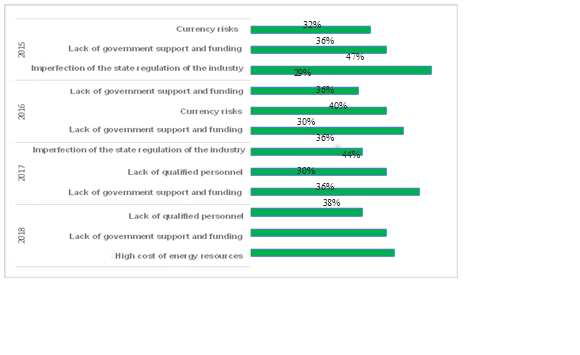
Today, there is a rather big difference in the development of the food industry in specific regions. Sizeable groups of the population suffer from malnutrition or starve. These reasons are determined, first of all, by the socio-economic development factors of a particular region of the Russian Federation, which in turn determine the risks that negatively affect the food supply of the population in Russia (Figure
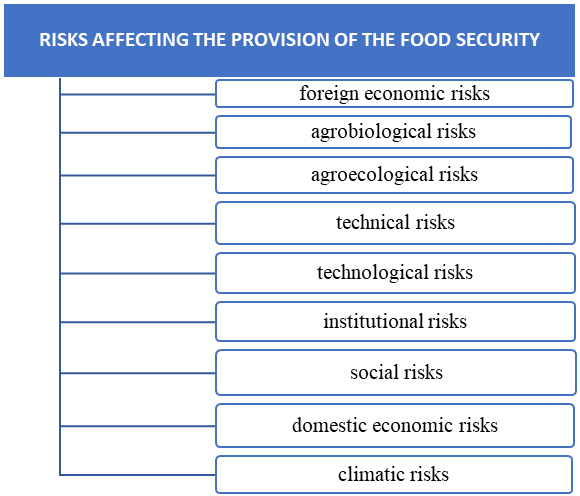
The real risks, today, are the loss of significant areas of arable land due to their salinization and waterlogging. The destruction of the ozone layer of the planet stratosphere and the consequences of growing ultraviolet radiation are of great concern. All these consequences will not only be detrimental but also long-term cumulative in nature.
Findings
The current political and economic situation in recent years has a great influence on the agricultural sector of the Russian Federation. On the one hand, the imposition of sanctions by the United States of America and the European Union negatively affected the provision of habitual food products to the population, on the other hand, it became an impetus for the development of the country's agro-industrial complex. This necessitates the adapting of the strategy for improving the agro-industrial complex to the prevailing circumstances, especially in the field of the import. This is the relevance of the article and the defined goal - to justify the importance of the import substitution policy in the agricultural sector of the Russian Federation.
The understanding by the state authorities of the existing problems in the analyzed sector of the economy determines the relevance of its modernization. In this situation, the role of the authorities’ increases, in fact, they need to act as a guarantor of support for improving the agricultural sector of the Russian Federation in the context of import substitution. Inactivity can pose a risk to the country's national security. Thus, the development of effective state programs and the subsequent state regulation of the agro-industrial complex is one of the primary tasks for the state authorities.
Also, the future of the Russian agro-industry and fisheries industry is directly dependent on the development and implementation of digital technologies.
Two goals of the strategy will contribute to the achievement of the national goal of creating a highly productive, export-oriented sector: increasing the export to at least $45 billion a year and, of course, ensuring the food security. The measures are included in the state program for the agro-industrial complex, in the federal project “Export of agricultural products”, as well as in the state program “Development of the fisheries industry”.
At the moment, the Ministry of Agriculture of Russia is paying close attention to increasing production volumes, including those with high-added value, as well as opening new markets, eliminating trade barriers, and developing effective supply chains.
Conclusion
Having analyzed the threats and the risks in providing the national food security, it can be suggested that only measures of state support for the industry can improve the quality of domestic products, as well as contribute to the effectiveness of the programs’ implementation to increase, develop and introduce new production technologies that can increase the production and consumption volumes.
Thus, innovative systems that preserve and strengthen natural resources, while increasing productivity, will be required to ensure national food security.
Undoubtedly, the development of agricultural sectors, as well as an increase in processing complexes, will reduce risks and threats in the most important world-class task - ensuring food security of countries.
The work attempts to justify the measures to improve the state regulation of the agro-industrial complex development, thereby showing the threats and risks of the national food security based on the consideration of the existing scientific developments.
References
- Altukhov, A. I. (2015). Food security in Russia: Issues of Methodology and Practice. Applied economic research, 5(9), 4-12.
- Altukhov, A. I. (2019). The food security paradigm of Russia: Monograph. Fund “Kadrovyi rezerv”.
- Altukhov, A. I., Semin, A. N., Semenova, E. I., Kislitsky, M. M., & Borodkin, A. E. (2019). The agro-industrial complex of Russia in the context of “big challenges”: problems, risks, new opportunities: monograph. Fund “Kadrovyi rezerv”.
- An overview of the agricultural market (2018). Research Center Deloitte. Electronic resource. https://www2.deloitte.com/ (accessed: 21.01.2020).
- Bychkova, C. V. (2016). The concept of solving the food problem. Agricultural science, 2, 7-12.
- Fyodorov, M. V., & Kurdyumov, A. V. (2012). Competitiveness and food security at the regional level. Food security, 2, 227-232.
- Kleiner, G. B. (2010). Development of the economic systems theory and its application in corporate and strategic management / Preprint # WP/2010/269. Central Economic and Mathematical Institute of the RAS.
- Komrakov, A. (2020). Russia food-secured itself from the citizens. http://www.ng.ru/economics/2020-01-22/1_7774_food.html
- Miloserdov, V. V., & Miloserdov, K. V. (2002). Agricultural policy of Russia - XX century. Ministry of Agriculture of Russia.
- Patrushev, D. (2020). On the development strategy of agriculture and fisheries industry for the period until 2030. Report at the Government Session. - January 19, 2020. https://http://government.ru/dep_news/39226/
- Ricardo, D. (1955). Articles on the agrarian question and criticisms of the book of Malthus. State Publishing House of Political Literature works.
- Ushacheva, I. T., Trubilina, E. S., Ogloblin, I. G., & Sandu, I. S. (2007). Innovative activity in the agricultural sector of the Russian economy. Kolos.
Copyright information

This work is licensed under a Creative Commons Attribution-NonCommercial-NoDerivatives 4.0 International License.
About this article
Publication Date
21 October 2020
Article Doi
eBook ISBN
978-1-80296-089-1
Publisher
European Publisher
Volume
90
Print ISBN (optional)
-
Edition Number
1st Edition
Pages
1-1677
Subjects
Economics, social trends, sustainability, modern society, behavioural sciences, education
Cite this article as:
Romanova, I. V., Kopteva, L., & Lashkova, N. (2020). Food Security Of Russia: Risks And Threats. In I. V. Kovalev, A. A. Voroshilova, G. Herwig, U. Umbetov, A. S. Budagov, & Y. Y. Bocharova (Eds.), Economic and Social Trends for Sustainability of Modern Society (ICEST 2020), vol 90. European Proceedings of Social and Behavioural Sciences (pp. 353-363). European Publisher. https://doi.org/10.15405/epsbs.2020.10.03.40

